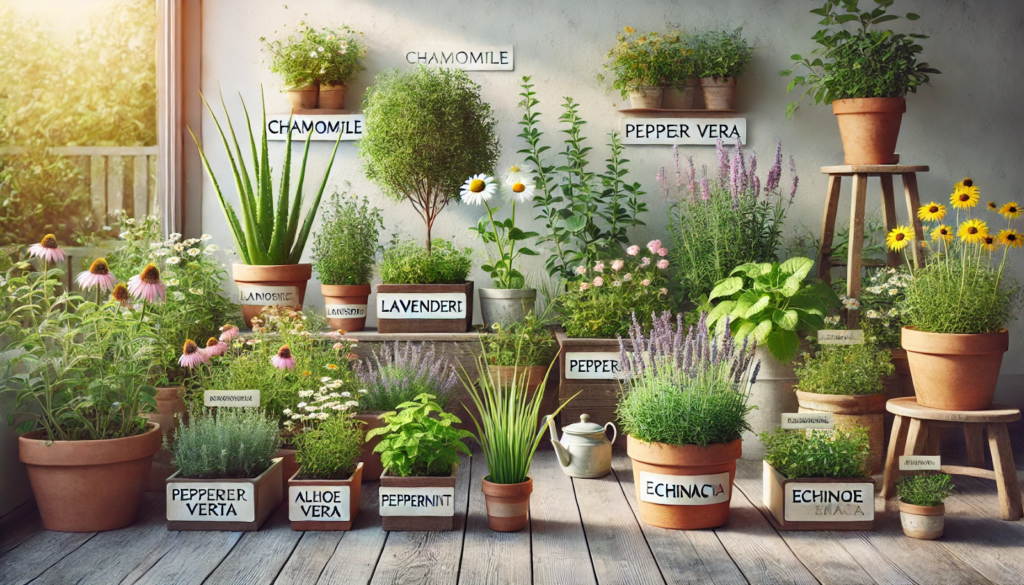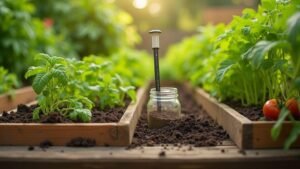Growing medicinal plants at home is a rewarding way to support your health naturally. These herbs are easy to cultivate, require little space, and can be used for teas, salves, tinctures, and more.
In this guide, you’ll discover the most useful and beginner-friendly medicinal plants to grow at home—and how to care for and use them safely.
1. Chamomile (Matricaria chamomilla)
Chamomile is a gentle herb known for its calming effects.
Benefits:
- Promotes sleep
- Reduces anxiety and stress
- Soothes digestive discomfort
How to Grow:
- Prefers full sun and well-drained soil
- Can be grown in containers or garden beds
- Harvest flowers when fully open and dry for tea
2. Lavender (Lavandula angustifolia)
Lavender is a fragrant herb with powerful therapeutic properties.
Benefits:
- Eases stress and tension
- Supports restful sleep
- Acts as a mild antiseptic
How to Grow:
- Needs full sun and dry, well-drained soil
- Perfect for raised beds, pots, or borders
- Prune regularly to maintain shape and encourage blooms
3. Peppermint (Mentha × piperita)
Peppermint is a fast-growing herb with cooling, soothing effects.
Benefits:
- Relieves headaches and muscle pain
- Eases nausea and indigestion
- Clears sinuses and supports respiratory health
How to Grow:
- Grows best in partial shade
- Spreads quickly—use containers to control growth
- Harvest leaves frequently to encourage new growth
4. Aloe Vera
Aloe vera is a succulent known for its gel, which soothes burns and skin irritations.
Benefits:
- Heals minor cuts and sunburns
- Moisturizes skin
- Supports digestion (when used properly)
How to Grow:
- Needs bright, indirect light
- Water deeply but infrequently
- Grows well indoors or in warm outdoor climates
5. Echinacea (Echinacea purpurea)
Also known as coneflower, echinacea is a beautiful perennial with strong immune-boosting properties.
Benefits:
- May reduce duration of colds
- Supports immune health
- Has anti-inflammatory properties
How to Grow:
- Full sun and well-drained soil
- Attracts pollinators
- Flowers can be harvested for tea or tinctures
6. Lemon Balm (Melissa officinalis)
A member of the mint family, lemon balm has a sweet, citrus scent and calming effects.
Benefits:
- Reduces anxiety and nervous tension
- Promotes sleep
- Eases digestive issues
How to Grow:
- Prefers full sun to partial shade
- Can grow in pots or directly in the ground
- Trim often to prevent flowering and encourage leaf production
7. Calendula (Calendula officinalis)
Also known as pot marigold, calendula is used for skin care and inflammation.
Benefits:
- Heals wounds, rashes, and cuts
- Reduces inflammation
- Supports oral health
How to Grow:
- Full sun with moderate watering
- Deadhead flowers regularly for more blooms
- Petals can be dried for salves, teas, and compresses
8. Holy Basil (Ocimum tenuiflorum / Tulsi)
Tulsi is a sacred herb in Ayurveda, prized for its adaptogenic properties.
Benefits:
- Helps the body manage stress
- Boosts immunity
- Supports respiratory health
How to Grow:
- Full sun and warm temperatures
- Grow in containers or garden beds
- Use leaves fresh or dried in tea
9. Sage (Salvia officinalis)
Sage is a versatile herb used in cooking and for its antimicrobial and cognitive benefits.
Benefits:
- Supports memory and concentration
- Has antibacterial and antifungal effects
- Soothes sore throats
How to Grow:
- Full sun and well-drained soil
- Drought-tolerant once established
- Trim back in spring to promote healthy growth
10. Thyme (Thymus vulgaris)
Thyme is a strong, fragrant herb with medicinal and culinary uses.
Benefits:
- Supports respiratory health
- Natural antiseptic
- Eases coughs and congestion
How to Grow:
- Prefers full sun and dry, rocky soil
- Ideal for containers and herb gardens
- Harvest often for best flavor and potency
Tips for Growing Medicinal Herbs at Home
- Use organic soil and avoid chemical pesticides
- Label plants clearly for easy identification
- Dry herbs in a cool, dark place to preserve potency
- Store in airtight containers out of direct sunlight
- Always research dosage and interactions before using
How to Use Medicinal Plants
Common Preparation Methods:
- Herbal tea: Steep dried or fresh leaves/flowers in hot water
- Salves and balms: Infuse oils and mix with beeswax for topical use
- Tinctures: Alcohol-based herbal extracts for internal use
- Compresses: Soaked cloths for external treatment of injuries
Always consult a healthcare provider if you’re pregnant, nursing, or on medication.
Conclusion: Healing from Your Own Garden
Growing medicinal plants at home empowers you to take charge of your health using nature’s most trusted remedies. With just a few pots or garden beds, you can cultivate a personal apothecary filled with healing herbs.
Start small, grow with care, and enjoy the soothing beauty and wellness benefits these plants offer every day.






